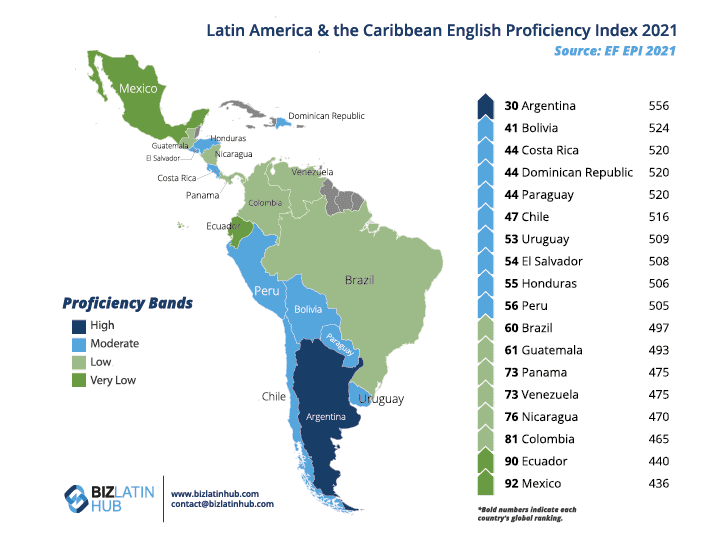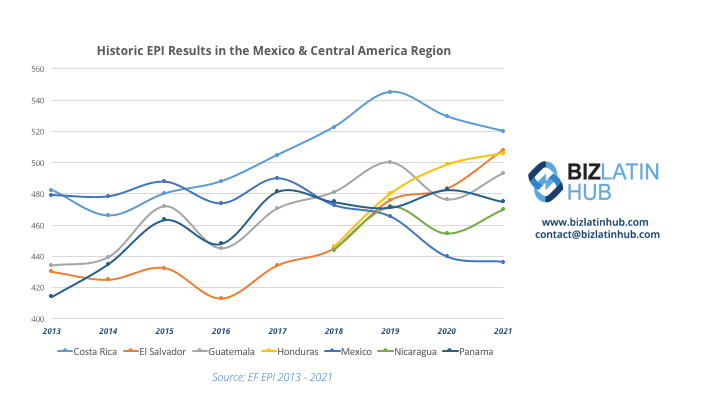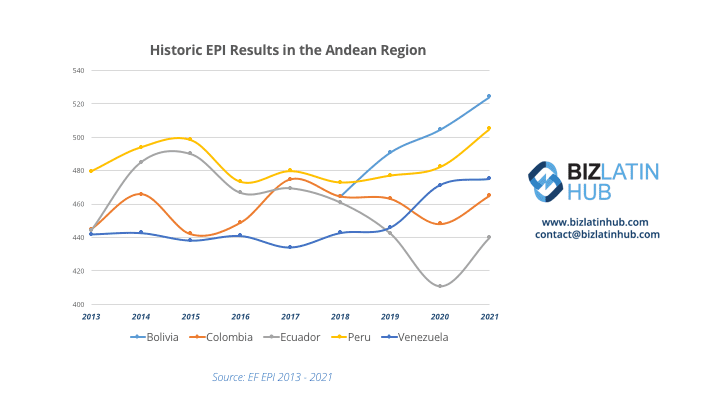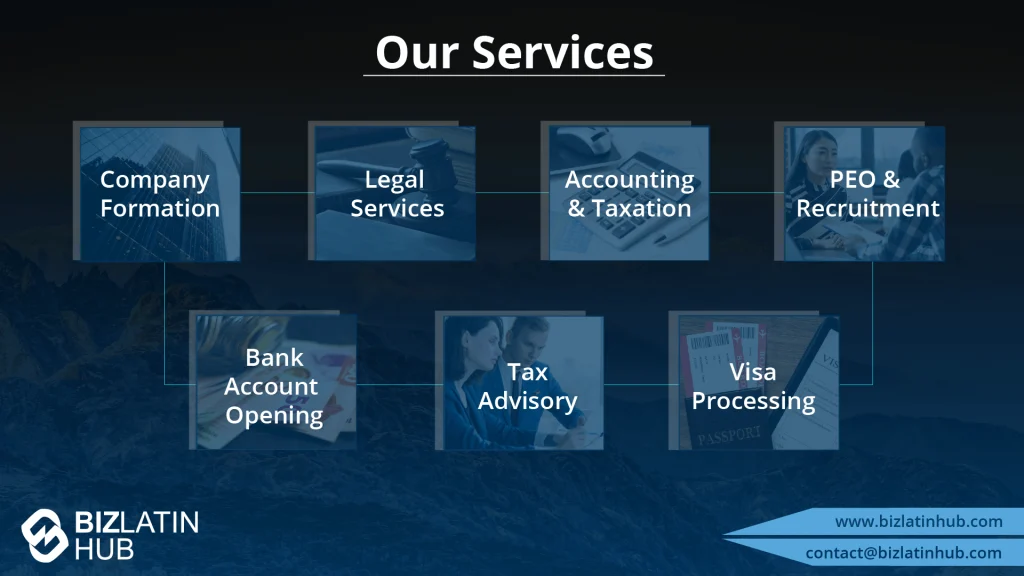Levels of English in Latin America improved during the pandemic, with more than 70% of countries from the region seeing proficiency grow during 2020, according to a new study.
The news will be of particular interest to investors and companies looking to enter the region, with higher levels of English in Latin America making it a more enticing destination for doing business.

Among the strongest performers was Bolivia, which leapt into second place in the region, according to the 2021 edition of the English Proficiency Index (EPI), published today by international education company Education First (EF).
According to Kate Bell, the lead author of the report, the newly published results followed a notable increase in people from Latin America seeking to test their English.
“The psychology of why people decide to test their English isn’t obvious, but if people are looking for work, considering a job change, actively studying English, or planning to start a course, they are more likely to test their English as part of that process,” she told Biz Latin Hub by email.
Using an 800-point scale, the 2021 EPI is based on test data taken from more than two million people who either sat the EF Standard English Test or took an EF English placement test throughout 2020.
According to the new report, Bolivia saw a 20-point jump in English proficiency between the 2020 and 2021 editions, leapfrogging Chile, Costa Rica, Cuba, and Paraguay to claim second spot in Latin America and the Caribbean.
SEE ALSO: 5 Advantages of Doing Business in Bolivia
That places them behind Argentina, the only country in the region to register a “high” level of English despite being one of five out of 19 countries from Latin America and the Caribbean to witness a slight decline in proficiency since the previous study. All other countries saw proficiency increase.
Other notable improvements were seen in the Dominican Republic, El Salvador, Honduras, and Uruguay, which all moved from “low” to “moderate” English levels, while Colombia moved from “very low” to “low”.
Non-traditional markets drive improvement
One of the most notable patterns regarding English in Latin America that emerges in the 2021 EPI is the fact that of the five nations that witnessed declines in proficiency scores, all are countries that are generally associated with good levels of the language.

Those include Argentina and Costa Rica, which each witnessed ten-point declines, as well as Panama (eight point decline), Chile (seven point decline), and Mexico (four point decline). That means that the improvements have been seen in many countries that would not usually be associated with high levels of English proficiency.
It is worth noting that, while many would expect Mexico to score well due to its proximity and cultural connections to the United States, the North American country has had one of the lowest scores in Latin America in recent years and registered a significantly lower EPI score than all of the countries in Central America.
Based on a comparison of annual EPIs — with pre-2020 scores adjusted to adhere to the 800-point scale introduced last year — another notable pattern to emerge from Central America is the significant and consistent increase in proficiency seen in El Salvador over recent years, with the country now boasting the second-highest score in Central America.
According to Bell, El Salvador is the “perfect demonstration” of a trend seen in levels of English in Latin America and elsewhere in the world, whereby adults in their 30s are driving improvements in overall proficiency as they seek new professional opportunities by improving their language skills.
“A lot of the blame for poor English gets laid at the feet of school systems. This data shows that workplaces (and employers) are powerful drivers of English language acquisition,” Bell wrote.
SEE ALSO: Starting a Business in El Salvador: 4 Considerations
Another notable trend highlighted by Bell is the fact that underlying Mexico’s overall decline in English proficiency over recent years is a growing disparity between states. According to Bell, the difference in proficiency between the strongest and weakest performing states has grown markedly. As Bell highlights, that represents an opportunity for the weaker performing states to learn from those which have seen proficiency grow.
“If I were trying to determine which factors are most important to improving English proficiency in Mexico, I’d look at the states with positive proficiency trends and copy what they’re doing,” she wrote.
Regional improvements in English in Latin America
While there were more mixed results in Mexico and Central America, with three of the seven countries among those to have seen declines, every country from the Andean region of South America (including Bolivia, Colombia, Ecuador, Peru, and Venezuela) saw English proficiency improve since the last EPI.

That included Bolivia, Ecuador, and Peru continuing the patterns of improving proficiency each has seen in recent years, while Colombia and Venezuela both bucked the declines they had witnessed over the previous five years.
Meanwhile, in the Southern Cone region (which includes Argentina, Brazil, Chile, Paraguay, and Uruguay), the improvements seen in Brazil, Uruguay, and Paraguay have been less profound than those seen in the Andean region.
In the case of the latter, while the improvement was a modest three points, in combination with Chile’s decline, it saw Paraguay move into second place in the region.
SEE ALSO: Paraguay Trademark Office Database: Get a Free Search
Another notable pattern seen in the latest edition of the EPI is the fact that English in Latin America appears to be improving at a faster rate than is being seen in the world overall, with the average score in Latin America rising by five points, compared to an average three-point increase seen globally.
That is despite the fact that Haiti has been included in the EPI for the first time in the 2021 edition and has by far the lowest score from the region. If Haiti is removed, the average score for Latin America and the Caribbean actually rose more than 16 points compared to last year.
That points to a highly encouraging pattern of an overall improvement in English in Latin America, which will be good news to investors from English-speaking countries, or who are used to doing business in English.
Biz Latin Hub can assist you doing business in Latin America
At Biz Latin Hub, we have multilingual teams of corporate support professionals based in 16 markets around Latin America and the Caribbean who are ready to help you expand and do business in the region.
Our comprehensive portfolio includes company formation, accounting & taxation, corporate legal services, due diligence, hiring & PEO, and visa processing, and we offer tailored packages of back-office services to suit every need.
Whether you are planning entry into a new market or are already active in the region, we help investors bridge the cultural and linguistic barriers they encounter, meaning that you don’t have to base your choices on where you will find the best spoken English in Latin America.
Contact us today to find out more about how we can support you doing business.
Or read about our team and expert authors.





